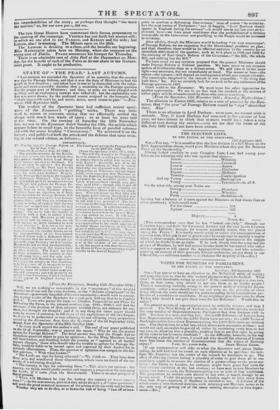VOTES FOR MEMBERS OF PARLIAMENT.
TO THE EDITOR Or THE SPECTATOR.
Ay!eshury, 6th September 1837.
SIR—You appear to have an objection to the Ballot.ball mode of voting; and your objection is, that by this method plumpers might he doubled. What then ? Would this double voting be unfair? If the constitution give a man two, three, or four votes, why should he not use them as he thinks proper? There is something radically wrong in the present mode of voting for Repre- sentatives: either a Irian should have but one vote, or, the p!zirality of votes being allowed, the voter should use his votes according to his euuscientious pre. fereoce of a candidate or candidates. If iny neighbour give three votes fur three Tories, why shunlil I not give three votes for one Reformer? Would this be unfair? "
The present system of representation must be radically wung ; and thus I prove it. The West Riding of Yorkshire, with its 21,000 electors, sends but the same nutnber of Representatives to Parliament that does Andover with its 210. But here is a more startling fact : The 5,879 Reformers of London have four Representatives, while the 5,873 Tories lave not any; the 2,639 Tories of Buckinghamshire have three Representatives, the 2,030 Refur mers are without one. Can that system be a fair one, which allows such anotnaliee as these ; and would not such anomalies be got rid of, either by reatricting every man to but one vote, or, allowing him a plurality, enabling him to use that right by giving all hiS votes to his favourite candidate ? As one difficulty, however, in the way of allowing a plurality of votes, I would ask why should the citizens of London have four times the number of Representatives that the citizen of Banbury [If our correspondent will refer to what the Spectator said about Ballot. voting, he will find that we raised no such objection as he speeities: the bril. liant Mr. LIDDELL has the credit of the remark he attributes to us. The effect of allowing electors having a plurality of votes to give them all to one candidate, might Inc to secure the election of a person othout to the great ma. j;)1•Ity : the Tories in London, fur instance, might have given four votes for their soli i.ary candid.tte at the last election; or have sent in two Aleinhers by giving two votes to each, the Reformers giving ogle to each of four candidates. The proposition to restrict each elector to one vote, is suund, though by no moans tmta.nh. Under the present ayateni, London ought to have many more than four Repre.entatives, if Banbury is entitled to one. A division of the whole count' y into electoral districts, each returning one Member, seems to be the only way of getting rid of the many existing anomalies ia this depart- rueut.—Eo.]


























 Previous page
Previous page